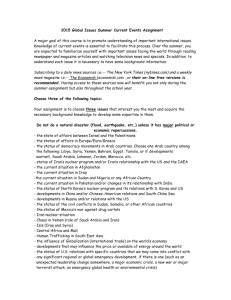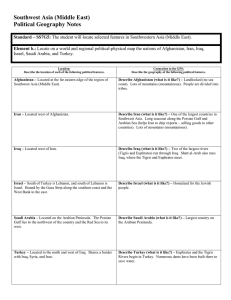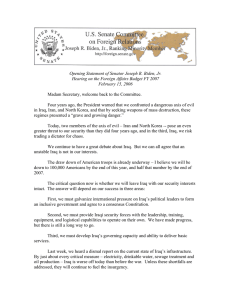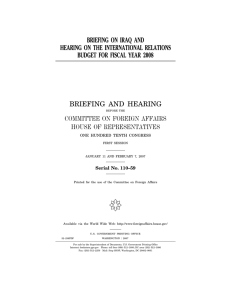For Release: Contact: Elizabeth Alexander February 8, 2007
advertisement
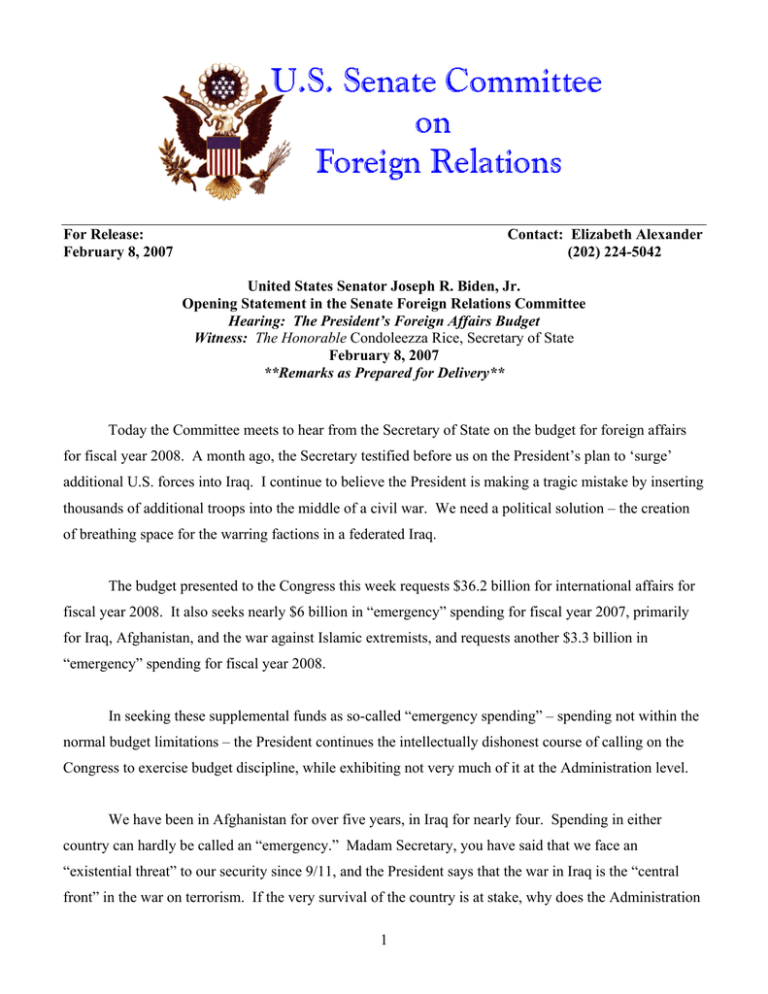
For Release: February 8, 2007 Contact: Elizabeth Alexander (202) 224-5042 United States Senator Joseph R. Biden, Jr. Opening Statement in the Senate Foreign Relations Committee Hearing: The President’s Foreign Affairs Budget Witness: The Honorable Condoleezza Rice, Secretary of State February 8, 2007 **Remarks as Prepared for Delivery** Today the Committee meets to hear from the Secretary of State on the budget for foreign affairs for fiscal year 2008. A month ago, the Secretary testified before us on the President’s plan to ‘surge’ additional U.S. forces into Iraq. I continue to believe the President is making a tragic mistake by inserting thousands of additional troops into the middle of a civil war. We need a political solution – the creation of breathing space for the warring factions in a federated Iraq. The budget presented to the Congress this week requests $36.2 billion for international affairs for fiscal year 2008. It also seeks nearly $6 billion in “emergency” spending for fiscal year 2007, primarily for Iraq, Afghanistan, and the war against Islamic extremists, and requests another $3.3 billion in “emergency” spending for fiscal year 2008. In seeking these supplemental funds as so-called “emergency spending” – spending not within the normal budget limitations – the President continues the intellectually dishonest course of calling on the Congress to exercise budget discipline, while exhibiting not very much of it at the Administration level. We have been in Afghanistan for over five years, in Iraq for nearly four. Spending in either country can hardly be called an “emergency.” Madam Secretary, you have said that we face an “existential threat” to our security since 9/11, and the President says that the war in Iraq is the “central front” in the war on terrorism. If the very survival of the country is at stake, why does the Administration 1 not come out and ask the American people to pay for these wars today, rather than burden the taxpayers of tomorrow with additional debt? Iraq dominates the time, attention, and resources of our national government. I would like to know how you are budgeting your own time as Secretary in dealing with Iraq, and how much time that leaves you to address the many other challenges confronting our country, specifically the on-going struggle for Afghanistan, the genocide afflicting Darfur, the Middle East peace process, the crisis in Lebanon, the nuclear weapons program in North Korea, and the nuclear ambitions of Iran. I am particularly interested in our strategy with regard to Iran. In recent weeks, we have deployed an additional carrier group to the Persian Gulf, let it be known that Iranian agents in Iraq could be targeted by the U.S. military, and in general, escalated the rhetoric. The threat posed by Iran and its nuclear ambitions is real. And any administration would and should use any means necessary to protect our soldiers. But if there is a coherent strategy in place to deal with Iran, I’d like to hear more about it. Maybe the strategy is this: by increasing pressure on Iran across the board, we put Tehran on the defensive and strengthen our hands in any future negotiations. That makes sense – provided we’re serious about talking. If we are, I would urge you to make it clear to the Iranians, our allies and the American people that we intend to talk. The subject to start with would be Iraq, where we have a shared interest in preventing a total breakdown. But it should go beyond that to encompass the full range of issues that divide us – the nuclear program, Iran’s support for terrorism, and its opposition to an Arab-Israeli peace. I do not agree with your assertion, Madam Secretary, that negotiations with Iran and Syria would be “extortion,” nor did most of the witnesses we heard in this Committee last month. The proper term is diplomacy, which is not about paying a price, but finding a way to protect our interests without engaging in military conflict. It is, I might add, the fundamental responsibility of the Department of State to engage in such diplomacy. As Lee Hamilton said “what are we afraid of? Do we have so little confidence in our diplomats?” The rhetoric coming from the Administration about Iran is starting to sound a little like the run-up to the Iraq war in the fall of 2002. If the President believes that the threat posed by Iran requires military 2 action, he should come to the Congress, and by extension the American people, to seek the legal authority from Congress to undertake it. He has no such authority to wage war against Iran today. Before I turn to Senator Lugar, let me note for the rest of the Committee that if we are able to get a quorum of eleven senators present at the same time, we will briefly interrupt the hearing to vote on the nomination of Ambassador Negroponte to be the Deputy Secretary. I am confident the Secretary will not object to this interruption. ### 3
